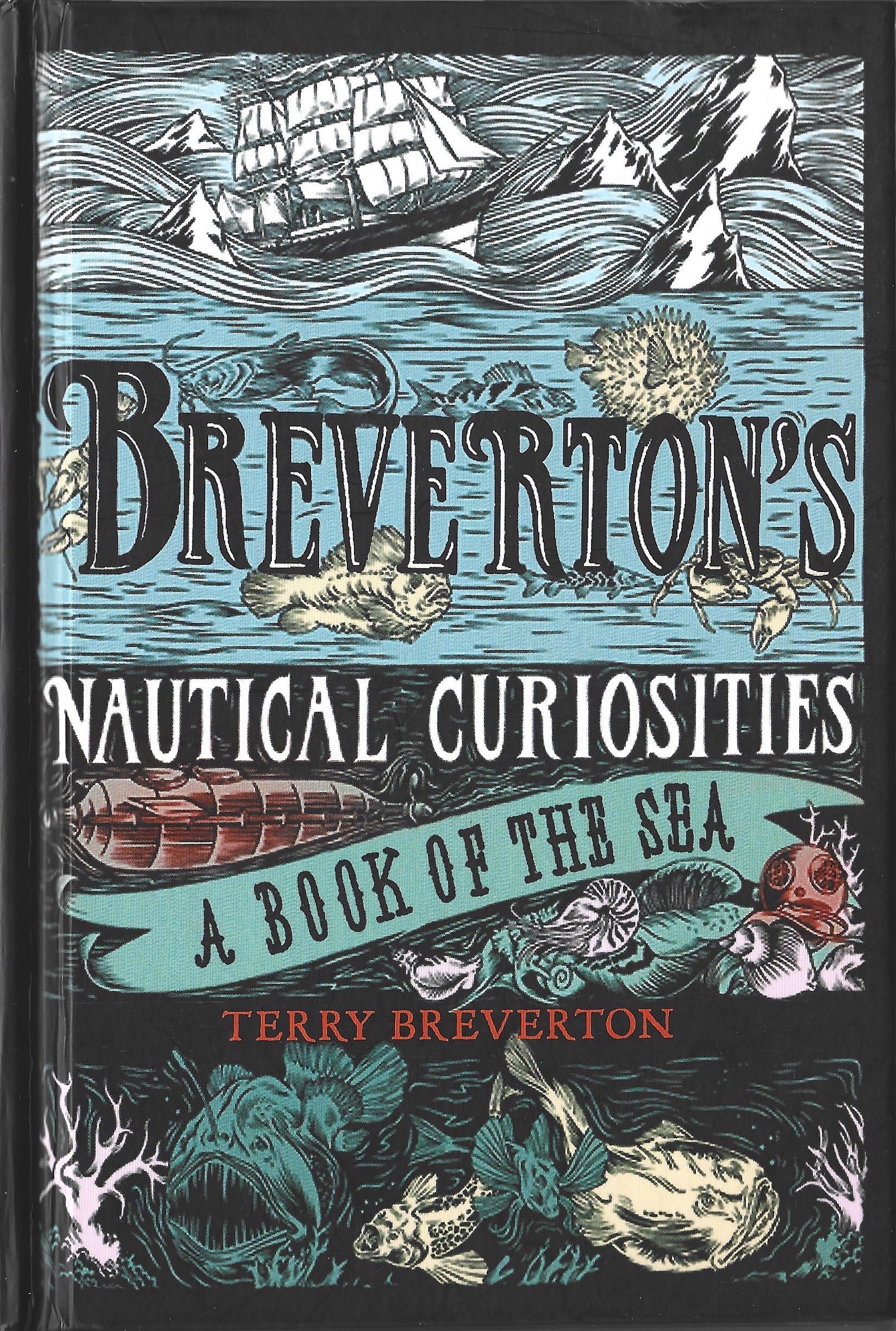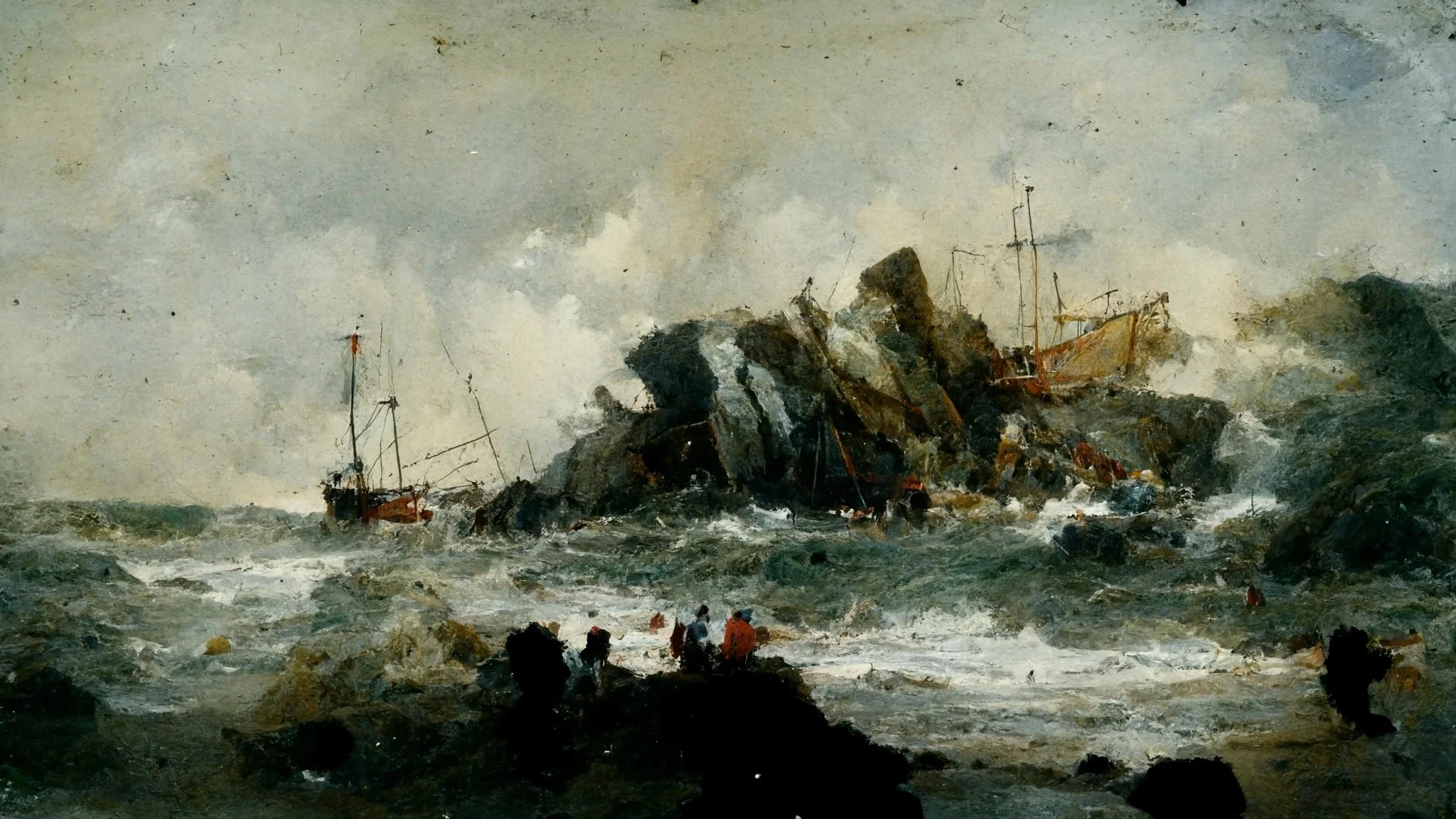Breverton's Nautical Curiosities ~ A Book of the Sea by Terry Breverton ~ Book Review

Book Review
Breverton's Nautical Curiosities ~ A Book of the Sea
by
Terry Breverton
Nature
SEAS and OCEANS
I have always loved the ships and sea. As a family, our annual excursion to Cornwall was with a sense of thrill and excitement that the recall sixty years on still captures.
That line in Psalm 107 in verse 23 always captured my imagination, and I’m sure that I’ve seen it penned as They that go down to the ships and the sea. And I prefer to think that it might be that, that I recall.
A gift took its place upon the shelf, and the other evening I chanced upon the gift’s exciting front cover, as well as the weight of its hard binding in the hand, which in itself prompted me to turn the cover and I immediately saw why.
This is a very high-quality bound work, each page is a delight, and I am thrilled to see the beautiful illustrations that accompany me as I learn about ships and the sea from the author’s skill and fluency, and the breadth, height and depth of his knowledge and expertise, so gently hidden behind a tiny title that might almost cause a person to pass on by ~ Breverton’s Nautical Curiosities.
Breverton’s Nautical Curiosities A Book of the Sea by Terry Breverton was first published in 2010 published by Quercus.
A search online affirms this book’s importance.
The author’s Introduction alone is a delight to read, so much so that I put aside what I was doing and was captivated by Terry Breverton’s injunction to us all as regards our attitude to our seas and oceans.
The case is stated, and by the time I had come to the last line of the Introduction, the case was, as we say in English Law, very firmly decided. (See Endnote)
I
Nature
SEAS and OCEANS
EXTRACT
by
Terry Breverton
Taken from page 7 of the Introduction by Terry Breverton regarding the Universe, the World and the relevance of the Seas and Oceans.
Extract begins
Aside from tales of Maritime heroism and treachery, and of human endeavour at sea, one of the greatest fascinations of the ocean lies beneath the waves.
Even today we know more about the surface of the Moon than we do about the unexplored depths of our oceans, and wonderfully strange life forms continue to be discovered there.
In the ‘Animals of the Seas’ section you will encounter some of the extraordinary diversity of the marine environment from ‘walking plants’ to the coelacanth (the world’s oldest fish, which predates the dinosaurs), or shrimps that emit a noise louder than a gunshot and the hugely mysterious giant squid.
You will also learn about the ocean’s apex predators – creatures such as the sperm whale, leopard seal, great white shark or the North Pacific giant octopus – and their incredible importance in the maintenance of the health of the seas.
These animals exist at the top of their respective food chains, but now most of them are endangered by man’s activities. If they are lost, life in the oceans will change adversely.
Without the seas there would be no life as we know it. They are even more important than the rainforests because they dictate both the pattern of our weather and the world's water supply. [The author] began writing this book initially to provide a source book of interesting and amusing nautical facts, but quickly came to realise that our oceans and the life that they support, need protection.
The rate of destruction of coral reefs, sea beds, mangrove swamps, fish and crustacean stocks, as well as of the top predators, is killing the ocean environment. When these effects are combined with man’s contribution to severe oceanic acidification and other maritime pollution, we find ourselves approaching a tipping point after which the seas may never recover in the lifetime of humankind: inexcusable treatment of a natural resource that has brought us so much excitement, incredible riches and breathtaking beauty.
There are far too many fascinating men and women, astonishing animals, remarkable ships, nautical sayings, ports and places for [the author] to be able to describe them exhaustively in this single volume, but [the author] hopes that the selection of entries included will encourage readers to learn more about the great waters that cover two-thirds of our planet and, above all, to appreciate the urgent need to protect them and preserve their integrity.
End of extract written by Terry Breverton (T.B.) in his Introduction (2010).
II
This Work is divided into nine very enjoyable and highly informative chapters.
Chapter 1 An A~Z of Sea Slang
Chapter 2 Sea Conditions and Weather
Chapter 3 Life at Sea
Chapter 4 Death at Sea
Chapter 5 Heroes, Heroines, Sea People and Navigation
Chapter 6 Villains of the Sea
Chapter 7 Islands, Ports, Harbours and Capes
Chapter 8 Animals of the Seas
Chapter 9 The Ocean Environment
These impressive chapters are a wonderful map to papers within each chapter, each paper dealing with a specific subject. In short, there are forty-three such papers. The book is finally supported by an impressive List of References and a very comprehensive Index.
III
Language comprises countless expressions, phrases and sayings that have passed down each century. They become expressions, and we often think we know what their origin is.
Just three superb examples.
CHOCK~A~BLOCK
CHOCK~A~BLOCK has been a favourite expression for a lifetime. How’s the traffic? Oh, don’t even ask! Chock-a-block!
I had no idea of its nautical origin, all the more embarrassing, given that I lived on the Liverpool Waterfront and Docks for fourteen years!
Mr Breverton informs us of the origin, thus:
“When two tackle blocks are so close to one another that there can be no movement in the sails. The sails could be pulled in tight so that the ship sailed ‘as close to the wind’ as possible. To ‘chock’ is to secure goods tightly on deck, when the vessel is rolling in high seas. Also known as ‘two blocks’. The modern term - ‘the room is chockers’ - meaning full, comes from chock-a-block.”
CLEAN SLATE (WIPE THE SLATE CLEAN)
“Courses, distances travelled and tax were at one time recorded on a log slate. On most ships, the first watch would record its observations on the slate. These will be carefully transcribed into a logbook before the next watch arrived. If there had been no problems, the new watch would disregard the old record and ‘start a clean slate’.”
BROUGHT UP SHORT
“If we say a person is brought up short, he is forced to a standstill by a sudden reversal of fortune. In the days of fighting ships a vessel underway could be brought to an emergency standstill or “brought up short” by dropping the anchors. As the anchor bit into the sea bed, the ship shuddered to a standstill, accompanied by tremendous noise and clashing of masts and rigging. This action was sometimes due to a shot having been fired across a vessel’s bows as a warning.
If she failed to stop, the next shot would be fired ‘true’, i.e. directly at her. That after a ‘warning shot across the bows’ it was hoped that the intended prize vessel would immediately drop anchor and be brought up short, or ‘brought up all standing’.”
One of my favourite sea paintings by Joseph Mallord William Turner RA (1775-1851) ~ we tend to see him referred to as JWM Turner ~ in this wonderful painting that is simply titled First Rate Taking in Stores 1818. As Mediastorehouse, online, records, 'This masterpiece, held at the Tate Gallery in London, captures the essence of the Royal Navy in the early 19th century.' Mediastorehouse UK website, here, is most certainly well worth visiting. KTW
End Notes ~ An Afterthought
In my introduction I used the legal phrases case stated and case decided. I decided to look out my old law books. The pages are yellowed now, but Osborne’s Concise Law Dictionary Sixth Edition by John Burke (published by Sweet and Maxwell in 1976 and reprinted 1978. I hasten to add that Osborn’s is now in its twelfth Edition (2013). Therefore, I quote the law as it was in 1978.
Case stated
Those are merely light-hearted tasters, because the author’s research and meticulous attention to detail make this book an essential read, and for all of us who live on islands, even out of sight of the sea, this Work will resonate.
The statement of the relevant facts in a case for the opinion or judgement of another court. After the hearing and decision of a case by justices or magistrates, a party may require a case to be stated for the opinion of the divisional court of the Queen's Bench Division (Magistrates Court Act 1952, section 87). Sometimes a case stated is referred to as a “special case”; e.g. an arbitrator or umpire may state an award in the form of a special case for the decision of the High Court (Arbitration Act 1950, section 21).
Appeal to the Court of Appeal from the decisions of the Lands Tribunal and other tribunals is by case stated (Order 61). Special cases may be stated in the High Court after proceedings have been commenced (Order 33, r.3).
When the Ruling is handed down (today by the Supreme Court) a case stated becomes a decided case.
“An appeal by way of case stated is an appeal to a Superior court on the basis of a set of facts (case) specified by the inferior court (stated) for the superior court to make a decision on the application of the law to those facts.”
“Appeals by way of Case Stated can be made by either the prosecution or defence and are reserved for appeals relating to matters of law.”
Decided Case
Decided Case
An example of a list of Decided Cases following judgments being handed down by the Justices of the Supreme Court.
In English Law, the peculiarities of high office remain, and an important part of the fabric of society. Thus, whilst in the higher courts a judge is referred to as Judge, in the Supreme Court - the highest Court of Law in the Land - members of the Judiciary retain the ancient title of Justice.
Where the Prosecution and Defence argue to the Bench that there is a matter in the proceedings that needs to be referred to higher authority, and if the Judge agrees to the merits of their contention, then the case will be stated to the higher court for deliberation and ruling.
Because it is a stated case, it has not yet been ruled upon. Therefore, any suggested change in law has not actually taken place.
The matter being referred to the Judges of the High Court or appellant court and, ultimately the Supreme Court, can often be highly contentious and even divisive. An example, outside our jurisdiction but known of by much of the world is the decision of the United States Supreme Court to reverse, by a margin of seven to two, the decision in Roe versus Wade.
If such a Roe v Wade type situation occurred in the United Kingdom, it is reasonable to assume that very considerable public disquiet and protest would follow through all four nations of the United Kingdom, and rightly so. This Country does not have the strictures of the troublesome bible belt that wends its way across many American states.
If the case decision is that the law must be interpreted afresh, then a decided case is considerable authority from that point onwards. Parliament must then decide whether to pass primary legislation to enshrine the case decision in statute law, or to leave it to be that incredibly important part of the English and Welsh legal system, whereby decided cases have the full weight of the law.
When the Ruling is handed down (today by the Supreme Court) a case stated becomes a decided case.
My Old Law Books
I remember, both as a probationer constable in the early 1972 and then taking my law degree 12 years later, how this was impressed upon me, and that I must be aware of the distinction between case stated and decided case and I have never forgotten that, and I simply quote here for posterity the law as it stood in my formative years.
“The statement of the relevant facts in a case for the opinion or judgement of another court. After the hearing and decision of a case by justices or magistrates, a party may require a case to be stated for the opinion of the divisional court of the Queen’s Bench Division (Magistrates Court Act 1952, section 87). Sometimes a case stated is referred to as a “special case”; e.g. an arbitrator or umpire may state an award in the form of a special case for the decision of the High Court (Arbitration Act 1950, section 21).
Appeal to the Court of Appeal from the decisions of the Lands Tribunal and other tribunals is by case stated (Order 61). Special cases may be stated in the High Court after proceedings have been commenced (Order 33, r.3).”
Osborn’s Concise Law Dictionary is now in its Twelfth Edition (2013) is still published by Sweet & Maxwell and currently edited by Mick Woodley of the University of York.
The Queen’s Bench Division has of course, upon the Accession of Charles III, become the King’s Bench Division and Barristers at Law who have taken Silk and become Queen’s Counsel (QC) are now automatically King’s Counsel (KC).
Now let us return to Breverton. We British are, after all a maritime people, a seafaring nation. On page 18 I find that Bremerton give’s me an accurate definition of a term that all of us use here.
NAIL COLOURS TO THE MAST
Defiance
Refusal
a very clear message that one intends to defeat the other regardless of the cost.
“A ship’s flags were identified by its colours. The colours were also a means of communicating.
To seize the colours was tantamount to victory and the vanquished to surrender.
So crews nailed the colours to the mast to prevent this.
It was also a clear message that the ship would fight. It would seek out its attacker and destroy.”
Finis
1 April 2025
Gallery of Occasional Artwork
Ken Webb is a writer and proofreader. His website, kennwebb.com, showcases his work as a writer, blogger and podcaster, resting on his successive careers as a police officer, progressing to a junior lawyer in succession and trusts as a Fellow of the Institute of Legal Executives, a retired officer with the Royal Air Force Volunteer Reserve, and latterly, for three years, the owner and editor of two lifestyle magazines in Liverpool.
He also just handed over a successful two year chairmanship in Gloucestershire with Cheltenham Regency Probus.
Pandemic aside, he spends his time equally between his city, Liverpool, and the county of his birth, Gloucestershire.
In this fast-paced present age, proof-reading is essential. And this skill also occasionally leads to copy-editing writers’ manuscripts for submission to publishers and also student and post graduate dissertations.
















